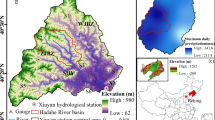
Overview
- Presents the latest technologies and advances in flood monitoring and forecasting
- Uses multidisciplinary and integrated approaches to understand wadi flash floods
- Is open access, which means that you have free and unlimited access
Part of the book series: Natural Disaster Science and Mitigation Engineering: DPRI reports (NADISME)
Buy print copy
Tax calculation will be finalised at checkout
About this book
This open access book brings together research studies, developments, and application-related flash flood topics on wadi systems in arid regions. The major merit of this comprehensive book is its focus on research and technical papers as well as case study applications in different regions worldwide that cover many topics and answer several scientific questions.
The book chapters comprehensively and significantly highlight different scientific research disciplines related to wadi flash floods, including climatology, hydrological models, new monitoring techniques, remote sensing techniques, field investigations, international collaboration projects, risk assessment and mitigation, sedimentation and sediment transport, and groundwater quality and quantity assessment and management.
In this book, the contributing authors (engineers, researchers, and professionals) introduce their recent scientific findings to develop suitable, applicable, and innovative tools forforecasting, mitigation, and water management as well as society development under seven main research themes as follows:
Part 1. Wadi Flash Flood Challenges and Strategies
Part 2. Hydrometeorology and Climate Changes
Part 3. Rainfall–Runoff Modeling and Approaches
Part 4. Disaster Risk Reduction and Mitigation
Part 5. Reservoir Sedimentation and Sediment Yield
Part 6. Groundwater Management
Part 7. Application and Case Studies
The book includes selected high-quality papers from five series of the International Symposium on Flash Floods in Wadi Systems (ISFF) that were held in 2015, 2016, 2017, 2018, and 2020 in Japan, Egypt, Oman, Morocco, and Japan, respectively. These collections of chapters could provide valuable guidance and scientific content not only for academics, researchers, and students but also for decision-makers in the MENA region and worldwide.
Similar content being viewed by others
Keywords
- Hydrometeorology and Climate Change
- Advances in Understanding Flood Modelling and Forecasting
- Data Challenges: Monitoring, Analysis, and Sharing
- Reservoir Sedimentation and Sediment Yield
- Surface Runoff and Groundwater Management
- Social and Environmental Aspects
- Flash Flood Mitigation Measures and Warning Systems
- Flash Flood Risk at UNESCO World Heritage Sites (WHS)
- Open Access
Table of contents (22 chapters)
-
Reservoir Sedimentation and Sediment Yield
-
Groundwater Management
-
Front Matter
-
Editors and Affiliations
About the editors
Tetsuya Sumi is a professor at the Water Resources Research Center, Disaster Prevention Research Institute, Kyoto University, Japan. He has a degree in civil engineering from Kyoto University. Subsequently, he worked for the Japanese Ministry of Construction. His specialties are hydraulics and dam engineering, with particular emphasis on integrated sediment management for reservoir sustainability and river basin environment improvement. He has contributed to several international associations and conferences, such as IAHR, ISRS, and ISE. He organized the 2nd International Workshop on Sediment Bypass Tunnels in 2017 in collaboration with ETH-Swiss and NTU-Taiwan. He recently conducted a general report of Q100 ‘RESERVOIR SEDIMENTATION AND SUSTAINABLE DEVELOPMENT’ at the 26th ICOLD Congress, Vienna, Austria, in July 2018.
Sameh A. Kantoush is currently an associate professor at Disaster Prevention Research Institute (DPRI), Kyoto University. He received his master’s and doctorate degrees in civil and environmental engineering from Saga University in Japan and the Swiss Federal Institute of Technology Lausanne (EPFL) in Switzerland, respectively. Prior to joining Kyoto, he served at the German University in Cairo (GUC) as an associate professor in the Civil Engineering Program. He is a member of the Japan Society of Civil Engineers (JSCE) and Syndicate of Engineers in Egypt. The industrial expertise of Dr. Kantoush is predominantly in infrastructure projects at multinational consulting firms in many countries. His research interests span the fundamentals of shallow flow and sediment transport, wadi flash floods, reservoir sustainability, ecohydraulics, dam impacts, and sediment management techniques.
Mohamed Saber is currently working as a specially appointed associate professor of the Water Resources Research Center, the Disaster Prevention Research Institute (DPRI), Kyoto University. He has a Ph.D. in Hydrology from Kyoto University, Japan, and has worked as an assistant professor at the Geology Department, Faculty of Science, Assiut University, Egypt. Saber has experience working and holding different positions, such as a senior researcher, Water Resources Research Center Disaster Prevention Research Institute, Kyoto University, Japan; a visiting professor, Geological Eng., Middle East Technical Univ., Turkey; a postdoctoral researcher, the University of Louisiana at Lafayette, LA, USA; a postdoctoral researcher, Kyoto University; and a research assistant, GCOE_ARS Project, Kyoto University, DPRI, Japan. Mohamed participated in more than 50 different publications and supervised more than 20 undergraduate, professional diploma, master’s and doctorate students. His research interests are mainly focused on flood forecasting and risk management, hydrometeorological analysis and climate change, water resources management, reservoir sedimentation management, and remote sensing and GIS applications, as well as machine learning techniques in flash flood risk assessment.
Bibliographic Information
Book Title: Wadi Flash Floods
Book Subtitle: Challenges and Advanced Approaches for Disaster Risk Reduction
Editors: Tetsuya Sumi, Sameh A. Kantoush, Mohamed Saber
Series Title: Natural Disaster Science and Mitigation Engineering: DPRI reports
DOI: https://doi.org/10.1007/978-981-16-2904-4
Publisher: Springer Singapore
eBook Packages: Earth and Environmental Science, Earth and Environmental Science (R0)
Copyright Information: The Editor(s) (if applicable) and The Author(s) 2022
Hardcover ISBN: 978-981-16-2903-7Published: 12 October 2021
Softcover ISBN: 978-981-16-2906-8Published: 12 October 2021
eBook ISBN: 978-981-16-2904-4Published: 11 October 2021
Series ISSN: 2196-4394
Series E-ISSN: 2196-4408
Edition Number: 1
Number of Pages: XXVIII, 551
Number of Illustrations: 51 b/w illustrations, 235 illustrations in colour
Topics: Natural Hazards, Hydrology/Water Resources, Climate Change/Climate Change Impacts, Sedimentology, Climate Change



